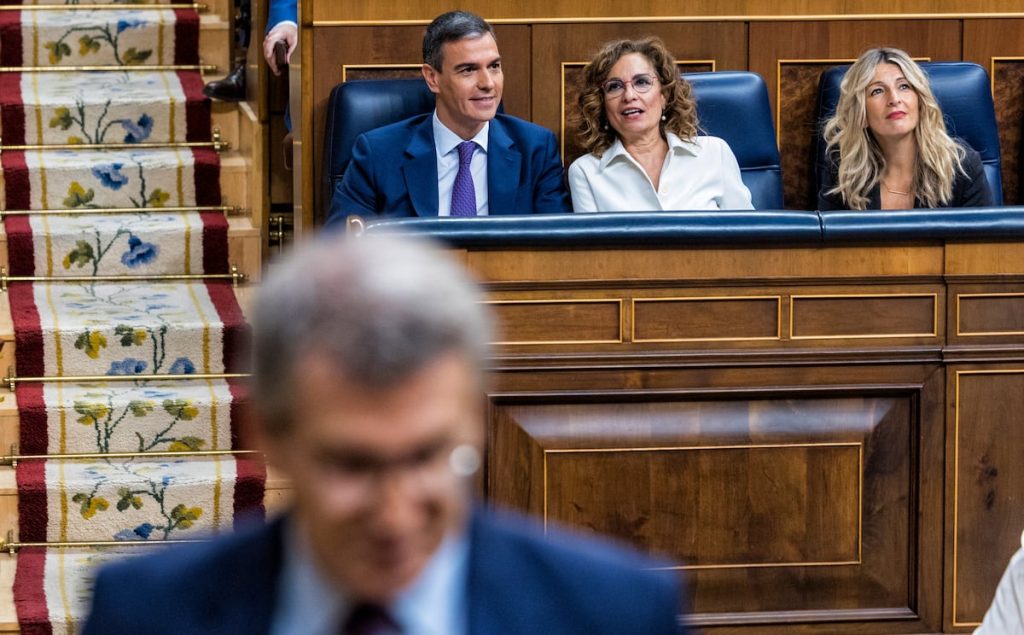Good morning. We start the live coverage of this Wednesday, May 29th, a day marked by the Government’s accountability session. The President, Pedro Sánchez, and the leader of the Popular Party, Alberto Núñez Feijóo, will face off in the chamber today, a day before the Congress of Deputies definitively approves the controversial amnesty law. The session will begin at 9:00 with an intervention by Feijóo, who will ask Sánchez if he is “concerned about the governance of the country.” Podemos leader, Ione Belarra, will also address the Prime Minister to delve into the “specific measures that the government will implement to promote a Spain and a Europe of peace.” Meanwhile, the campaign for the European elections on June 9th continues. The head of the PP list, Dolors Montserrat, will travel to Avilés and Ponferrada, while the socialist Teresa Ribera will be in Brussels and the Vox leader, Santiago Abascal, in Valladolid. The former minister and head of the Podemos list, Irene Montero, will participate in an event in Leganés (Madrid).
The session of control to the Government begins with the confrontation between Pedro Sánchez and Alberto Núñez Feijóo. Feijóo questions Sánchez about the governance of the country and expresses his concerns. Meanwhile, Ione Belarra of Podemos calls on the government to implement specific measures to promote peace in Spain and across Europe. The European election campaign also continues, with political leaders traveling to different cities to rally support. Dolors Montserrat, Teresa Ribera, Santiago Abascal, and Irene Montero are all actively participating in campaign events, engaging with voters and sharing their vision for the future. The upcoming approval of the controversial amnesty law adds a layer of tension to the political landscape as discussions on governance and peace take center stage.
In this context of political tensions and election campaigns, the different parties are focusing on their messages and strategies to attract voters. Feijóo’s questioning of Sánchez’s governance and Belarra’s call for peace initiatives suggest that the issues of governance and peace are key priorities for their respective parties. The European election campaign offers an opportunity for politicians to connect with voters and showcase their policy proposals. The head of the PP list, Dolors Montserrat, is visiting Avilés and Ponferrada, engaging with voters and discussing the party’s platform. Similarly, Teresa Ribera is in Brussels, and Santiago Abascal is in Valladolid, demonstrating the geographical spread of campaign efforts.
The involvement of political leaders in different cities reflects the diverse interests and concerns of voters across Spain. Irene Montero’s participation in an event in Leganés highlights the importance of grassroots engagement and local support for political parties. The upcoming approval of the amnesty law adds a layer of complexity to the political landscape, with parties positioning themselves on the issue. The session of control to the Government serves as a platform for opposition parties to question the government and hold it accountable for its actions. As the day unfolds, the political dynamics will continue to evolve, shaping the narrative leading up to the European elections.
Overall, the live coverage of this Wednesday highlights the political dynamics and challenges facing Spain. The session of control to the Government, the European election campaign, and the debate around the controversial amnesty law offer a glimpse into the current state of affairs in the country. The engagement of political leaders, the focus on governance and peace, and the grassroots campaign efforts all contribute to the complex political landscape. As the day progresses, the outcomes of the accountability session and the campaign events will provide further insights into the attitudes and priorities of both voters and politicians. The interactions between political parties and voters will continue to shape the direction of Spanish politics in the lead-up to the European elections and beyond.














